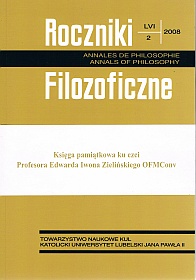Późnoantyczne próby obalenia determinizmu: Aleksander z Afrodyzji i Chalcydiusz
Abstrakt
In this article the author analyses two polemics against the stoic conception of fate – by Alexander of Aphrodisias and by Chalcidius. Alexander, who wants to show the Aristotelian doctrine of fate, presents the subject against a background of the stoic conception, pointing out its disadvantages. He deals with the ideas concerning the existence and meaning of possibility in determinism. He also discusses issues referring to the free will of a man, free choices and their consequences. Chalcidius talks about the matters of evil and its beginnings, as he finds the stoics unable to give satisfactory answers to these questions. Not only similarities are there between Alexander and Chalcidius, but many differences as well. They are caused by the different backgrounds of the two critics of determinism. Alexander sees himself as an orthodox peripateticienne, whereas Chalcidius places his conceptions in the context of Platon’s teachings about fate.
Bibliografia
Alexander Aphrodisiensis, De fato, ed. I. Bruns, Commentaria in Aristotelem Graeca, Supp. 2.2, Berlin 1892 (pol. [fragmenty]: przeł. M. Komsta, „Roczniki Filozoficzne” 51 (2003), z. 1, s. 444-490; ang.: Alexander of Aphrodisias, On Fate, transl. R. W. Sharples, London 1983).
Der Boeft J.: Calcidius on Fate. His Doctrine and Sources, Leiden 1970.
Dragona-Monachou M.: Divine Providence in the Philosophy of the Empire, [w:] Aufstieg und Niedergang der römischen Welt, II. 36.7, ed. W. Haase, Berlin–New York: Walter de Gruyter & Co. 1994, s. 4417-4490.
Furley D. J.: Aristotle on the Voluntary, [w:] Articles on Aristotle, Part II, ed. by J. Barnes, R. Sorabji, London 1977, s. 47-60.
Huby P.: The First Discovery of the Free Will Problem, „Philosophy” 42 (1967).
Rist J. M.: Seneca and Stoic Orthodoxy, [w:] Aufstieg und Niedergang der römischen Welt, II. 36.3, ed. W. Haase, Berlin–New York: Walter de Gruyter & Co. 1989, s. 1993-2012.
Sharples R. W.: Aristotelian and Stoic Conception of Necessity in the De fato of Alexander of Aphrodisias, „Phronesis” 20 (1975), s. 247-274.
Sharples R. W.: If What Is Earlier, Then of Necessity What is Later? Same Ancient Discussions of Aristotle, De generatione et corruptione 2.11, „Bulletin of the Institute of Classical Studies” 26 (1979), s. 27-44.
Sulowski J.: Kalcydiusz, jedno ze źródeł filozofii średniowiecznej, „Studia Filozoficzne” 29 (1962).
Waszink J. H., Jensen P. J.: Timaeus a Calcidio translatus commentarioque instructus, Leiden 1962.
White J. M.: Causes as Necessary Conditions. Aristotle, Alexander of Aphrodosias and J. L. Mackie, [w:] New Essays on Aristotle, ed. F. J. Pelletier, J. King-Farlow, Guelp 1984, s. 157-189.
Copyright (c) 2008 Roczniki Filozoficzne

Utwór dostępny jest na licencji Creative Commons Uznanie autorstwa – Użycie niekomercyjne – Bez utworów zależnych 4.0 Międzynarodowe.





